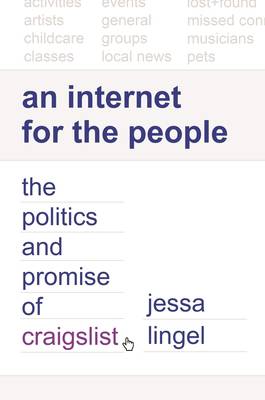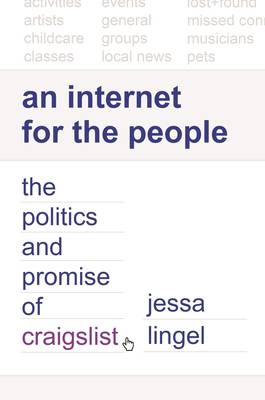
- Afhalen na 1 uur in een winkel met voorraad
- Gratis thuislevering in België vanaf € 30
- Ruim aanbod met 7 miljoen producten
- Afhalen na 1 uur in een winkel met voorraad
- Gratis thuislevering in België vanaf € 30
- Ruim aanbod met 7 miljoen producten
Zoeken
Omschrijving
How craigslist champions openness, democracy, and other vanishing principles of the early web
Begun by Craig Newmark as an e-mail to some friends about cool events happening around San Francisco, craigslist is now the leading classifieds service on the planet. It is also a throwback to the early internet. The website has barely seen an upgrade since it launched in 1996. There are no banner ads. The company doesn't profit off your data. An Internet for the People explores how people use craigslist to buy and sell, find work, and find love--and reveals why craigslist is becoming a lonely outpost in an increasingly corporatized web. Drawing on interviews with craigslist insiders and ordinary users, Jessa Lingel looks at the site's history and values, showing how it has mostly stayed the same while the web around it has become more commercial and far less open. She examines craigslist's legal history, describing the company's courtroom battles over issues of freedom of expression and data privacy, and explains the importance of locality in the social relationships fostered by the site. More than an online garage sale, job board, or dating site, craigslist holds vital lessons for the rest of the web. It is a website that values user privacy over profits, ease of use over slick design, and an ethos of the early web that might just hold the key to a more open, transparent, and democratic internet.Specificaties
Betrokkenen
- Auteur(s):
- Uitgeverij:
Inhoud
- Aantal bladzijden:
- 208
- Taal:
- Engels
- Reeks:
- Reeksnummer:
- nr. 2
Eigenschappen
- Productcode (EAN):
- 9780691235615
- Verschijningsdatum:
- 14/06/2022
- Uitvoering:
- Paperback
- Formaat:
- Trade paperback (VS)
- Afmetingen:
- 150 mm x 230 mm
- Gewicht:
- 317 g

Alleen bij Standaard Boekhandel
+ 80 punten op je klantenkaart van Standaard Boekhandel
Beoordelingen
We publiceren alleen reviews die voldoen aan de voorwaarden voor reviews. Bekijk onze voorwaarden voor reviews.











